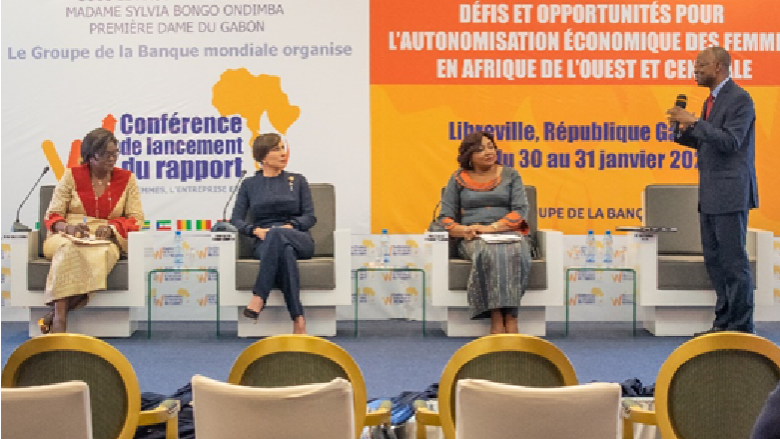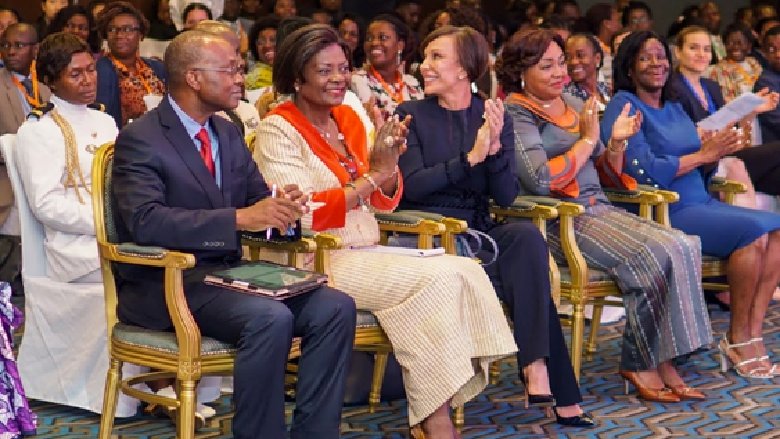The newly launched Women, Business and the Law 2022 report documents 23 economies that adopted legal reforms improving women’s legal equality and opening new prospects to become entrepreneurs. One country that stands out in particular is Gabon. The country enacted major amendments to the first chapter of its civil code which addresses family law and adopted a specific law on violence against women last year. This affects five of the eight Women, Business and the Law indicators that measure women’s economic opportunities: Mobility, Workplace, Marriage, Entrepreneurship, and Assets (figure 1). For example, under the revised Civil Code of Gabon, a husband is no longer allowed to go to court and prevent his wife from working in the interest of the family. Now, both spouses may exercise a profession of their choice. Overall, the husband is no longer designated as the head of the family and sole decision-maker over the finances of the family. Instead, the revised civil code states: “The family is managed jointly by the spouses in the interest of the household and the children.” And: “The spouses shall jointly administer the common property.” Gabon’s violence against women law also establishes many good practices, by targeting physical, sexual, psychological, and economic forms of abuse, providing criminal penalties for violent crimes committed against women, and requiring protection orders for victims of violence to be delivered within two days after receipt of a complaint.
So what made this suite of reforms possible? The answers are data, collaboration, a strong political commitment, led by civil society and the First Lady of Gabon Sylvia Bongo Ondimba, as well as an understanding of the benefits of legal reform.
For the past two years, the Women, Business and the Law team had been working closely with the World Bank’s country office and the political leadership in Gabon. Several large-scale events were organized – but the catalyst was the launch conference of the Women, Business and the Law 2020 report in Libreville in January 2020. During this high-level event, senior policy makers and women’s rights advocates from 14 West and Central African economies came together under the patronage of the First Ladies of Gabon, Burkina Faso, and the Democratic Republic of the Congo – Her Excellencies Madame Sylvia Bongo Ondimba, Madame Denise Nyakeru Tshisekedi, and Madame Sika Bella Kaboré. Participants discussed discriminatory laws and practices that hinder the full and equal participation of women in society. Many women entrepreneurs spoke about challenges they face, but also showed their strong entrepreneurial spirit and economic successes. Discriminatory laws were identified as one of many barriers, among negative stereotypes against working women and lack of role models and support networks.

Women, Business and the Law data highlighted the need to reform
The Women, Business and the Law data was presented to show the links between economic inclusion and legal reform – and highlight existing gaps. While the sharing of experiences and good practices is incredibly important when designing a political reform agenda, strong data made all the difference in setting priorities. Women, Business and the Law made it easy for legislators to see where the shortcomings of the Gabonese law were. On the one hand, giving certain prerogatives to the husband under the civil code introduced in 1972 was no longer reflective of the fundamental contributions that women provide to the Gabonese economy today. On the other hand, women do face additional barriers compared to men, such as lack of credit to start a business and experience of violence and sexual harassment. So outdated and discriminatory provisions in the civil code needed to be amended, and progressive laws to support women needed to be enacted.
A high-level task force tackles the reform agenda
Gabon had already been on the path to reform with the President Ali Bongo Ondimba launching the “Decade of the Gabonese Woman” in 2015. Several actions sped up following the launch event, including the development of a strategy labelled “Gabon Equality” for reducing gender inequality in Gabon and the establishment of a high-level multisectoral governmental taskforce. Under the leadership of the First Lady of Gabon, “La Task Force” comprises the Prime Minister, the Ministers of Justice, Women’s Rights, Education, Health, and Interior, and international actors, such as the World Bank Group. The Task Force meets every three months to ensure the implementation and regular follow up on the reform process. In total, 33 measures were identified in the Gabon Equality strategy to address gender inequalities and cement the pivotal role that women play in society. This is the first time that the country’s legal framework was overhauled in a comprehensive manner.
The law catches up with reality
As the Minister of Justice of Gabon, Erlyne Antonella Ndembet explains, the reforms were inspired by the need for “compliance of the domestic legal framework with international conventions and the constant concern for the well-being of Gabonese women.” This means that discriminatory provisions were rewritten, with the aim to strengthen family cohesion and a focus on the complementarity and equal partnership between women and men. Moreover, the law is now set to fulfil its important role as a tool to more adequately protect women in a society where they constitute 90% of victims of sexual violence. But it doesn’t stop there. During the most recent meeting of the task force, many accompanying programs on implementation were discussed, so that women across the country know about their rights and how to claim them.
Note: The Women, Business and the Law team’s engagement with African civil society organizations and peer-to-peer events, like the one described in Gabon, are supported by the William and Flora Hewlett Foundation.


